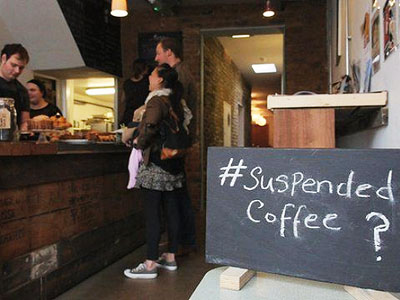A cup of coffee changes the world.

European and American coffee shops offering "suspended coffee" service
■ Zhang Baoyu
In a coffee shop, if someone suddenly handed over a free drink, would you gladly take it, or would you hesitate? Charity is a good thing, but this kind of charity is often met with suspicion and disdain in life. An occasional setback in doing good made Sandy Mann, a professor of psychology at the University of Central Lancashire in England, start thinking about why helping others and accepting their kindness has become so difficult in daily life.
"from beginning to end, the most common reaction was doubt."
Because of her work, Sandy moved her family to Preston, near the old English city of Liverpool. One morning, she took the children to a nearby coffee shop for breakfast. Because her 7-year-old son didn't want coffee, Sandy decided to give away the extra cup of coffee in the set meal to other guests for free.
"I thought someone would embrace it and feel happy." "on the contrary, no one wanted to take the cup of coffee," Sandy said. "I saw a lot of confused eyes that seemed to wonder if I was spitting in the coffee, or if it was poisonous." Sandy had to give up. "it shouldn't be like this! Even I wonder if I have done something wrong, but I just want to avoid waste and want to give it to others. " She said.
Frustrated unexpectedly, Sandy began to think about the "philosophy of generosity" for others and to understand why people reject kindness from strangers. For the next 13 days, she showed up at the coffee shop almost every day, bought an extra cup of coffee and tried to give it to others. On rainy days, she also tries to provide umbrellas or pay for parking so that the guests at the back of the line check out first.
"I don't expect anything in return, but I hope to form a butterfly effect that conveys good deeds and eventually let love flow all over the world." Sandy said, "but from beginning to end, the most common reaction was skepticism. People have been taught since childhood that strangers can cause trouble and even danger. "
Lower "the height of the giver"
In the process of consulting relevant books, Sandy found that there is a long history of buying coffee for others. In Italy a century ago, Neapolitans would buy two cups of coffee when they visited a local cafe, one for themselves and the other at the counter for cash-strapped people to claim later.
This kind of charity is called "coffee to be used". Although it is an easy effort, it is still praised and used a hundred years later because of the strong human feelings behind it.
Italian writer Lucia Crishenzo (Luciano de Crescenzo), author of Coffee to be used: wisdom in Daily Life, has said that this is a very elegant and wise approach, in which donors and recipients do not meet, generous people are not labeled as showing off their wealth, and the latter need not be grateful.
The current sluggish European economy has made the concepts of "pending coffee" and "giving for others" popular again. In Bulgaria, neighboring Italy, 150 cafes have spontaneously formed a "suspended coffee" camp to promote this charity. According to the Huffington Post, Starbucks in the UK also practices philanthropy in this way, converting each cup of "suspended coffee" into cash and donating it to charity.
After comparing her approach with "suspended coffee", Sandy decided to "sell" the coffee in a different way. First of all, she lowered the "height of the philanthropist"-still offering a cup of free coffee, but Sandy made it clear that this was something her son did not want to drink. "there will still be people who refuse, but I clearly find that their doubts have dissipated. They will smile and say thank you. Finally, a woman named Rachel took the cup of coffee, and next week she found a chance to buy someone a drink.
"compared with what I did before, the later approach was more logical, but at the same time less selfless. The point is that people are more receptive to the latter approach. " Sandy said. Now, her proposal of "giving for others" has become a popular and influential activity. searching for relevant entries on the Internet, you can read a lot of heartwarming stories about helping others.
Sandy recorded the joy and embarrassment of doing good deeds around the world into the publication of giving for others: a cup of coffee changes the world. Sandy says she will donate royalties to patients with muscular dystrophy.
As a clinical psychologist, Sandy advises people with depression to take part in public welfare. She found that being charitable is very helpful in treating depression and can stimulate the happiness and satisfaction that patients have not seen for a long time.
"it's not a cure, but it's very effective. People with depression always feel that they can't find the meaning of life or the value of their existence, and it's good to simply do some charity work." Sandy advises people to do what they can when they feel comfortable, such as smiling at others or chatting happily with the salesperson. "praising others is a simple thing, but also the most popular act of kindness."
Important Notice :
前街咖啡 FrontStreet Coffee has moved to new addredd:
FrontStreet Coffee Address: 315,Donghua East Road,GuangZhou
Tel:020 38364473
- Prev

Tea drinks and coffee are widely sought after by consumers
The outdoor sample group of Kaidu Consumer Index (affiliated to CCTV Market Research (CTR) in China) found that in the outdoor beverage market in first-and second-tier cities across the country, the contribution of current beverages in 2016 has reached 45%, and its penetration rate has reached 66%, that is, people who buy ready-made drinks at least once in 2016. Now
- Next

This company promotes the world's first "colorless" coffee so that you are not afraid of teeth being stained yellow
CLR CFF, a company from Slovakia, recently launched the world's first colorless clear coffee, causing discussion. Taiwanese people especially love to drink coffee. It can be seen from the coffee shops in the streets that many people are accustomed to drinking a cup a day. However, drinking too much coffee may also cause oral problems, such as teeth.
Related
- The difference between American coffee with milk and no milk! What ratio of coffee beans and parameters are the most suitable for making Italian American coffee?
- How did civet poop coffee come from? What is the difference between it and Mantelin? Are Indonesia's three top coffees cat poop coffee really cat poop?
- What is the difference between the taste parameters of espresso and hand-brewed coffee? Is it better to make coffee by hand or American coffee in black coffee?
- Is Yunnan small grain Arabica or Robsta? Does Arabica coffee in Yunnan, China, refer to Katim or Iron Picka?
- Bought it for a day?! Lucky launched the new "Good Persimmon Double Fruit Tea"
- The paper bag is damaged in rainy days and knocked over takeout! Starbucks: It is urgently optimizing packaging
- The sum of the details you need to pay attention to when blending Italian latte and flowers! What do the flow rate and flow distance when making coffee flower patterns?
- What is the difference between Flat red and Flat white? What are the best proportion parameters for making Pinghong coffee?
- What should I use to make coffee with ice cubes? What should I use to make coffee by hand? Does the ice cup have ice?
- Why does Italian hand-brewed coffee taste sweet without sugar? Is the sweetness of coffee affected by variety parameter processing or extraction roasting?

